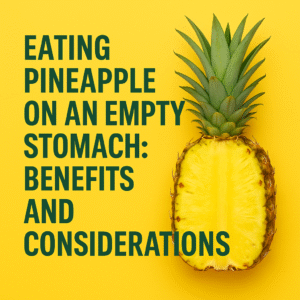
Pineapple is one of the most refreshing tropical fruits, loved for its sweet-tart taste and juicy texture. But a popular question many health-conscious eaters ask is: “Is it okay to eat pineapple on an empty stomach?” Like many health topics, there’s both truth and myth surrounding this practice.
In this article, we’ll explore the benefits of consuming this fruit first thing in the morning, common myths, potential side effects, and what science says about eating it on an empty stomach.
🌅 Why Eat Pineapple on an Empty Stomach?
Eating this fruit in the morning, especially before other foods, can offer unique digestive and nutritional advantages. Because the stomach is empty, absorption of nutrients can happen more efficiently.
💡 Digestive Benefits of Pineapple in the Morning
Pineapple contains a powerful enzyme called bromelain, which helps break down protein in the digestive system. When eaten first thing in the morning, bromelain can:
-
Boost digestion before heavier meals
-
Reduce bloating and stomach discomfort
-
Help cleanse the digestive tract
Combined with the fiber in this fruit, it supports bowel movements and gut health—especially when consumed before other foods interfere.
⚡ Nutrient Absorption Is Higher
Another potential benefit of eating pineapple on an empty stomach is better vitamin and mineral absorption. The fruit is packed with:
-
Vitamin C – immune and skin support
-
Manganese – metabolism and bone strength
-
B vitamins – energy support
-
Antioxidants – cellular protection
Eating it alone allows your stomach to absorb these nutrients without interference from fats, proteins, or processed carbs.
🧪 What Science Says About Pineapple First Thing in the Morning
There’s no strict medical rule against eating pineapple early in the day. In fact, nutritionists often suggest fruit on an empty stomach to kick-start metabolism and boost hydration, especially since pineapple is over 85% water.
According to Mount Sinai, bromelain supports digestion and inflammation management, which may explain why some people feel better after eating pineapple first thing.
🚫 Myths About Pineapple on an Empty Stomach
Let’s debunk some common myths:
❌ “it will destroy your stomach lining.”
This myth stems from pineapple’s acidity and its enzyme bromelain. While bromelain breaks down proteins, it does not damage your stomach lining. In fact, your stomach is well protected by natural mucus.
Reality: Unless you have a sensitive stomach or existing ulcers, it is safe.
❌ “It causes ulcers if eaten raw.”
This is untrue. this fruit does not cause ulcers, though eating large amounts on an empty stomach may irritate those with existing digestive disorders.
🍍 Potential Side Effects When Eaten on an Empty Stomach
While this tropical fruit has many benefits, eating it on an empty stomach may cause mild discomfort for some people.
⚠️ Acidity
this golden fruit is acidic (pH around 3.2–4.0). In sensitive individuals, this might trigger:
-
Acid reflux
-
Heartburn
-
Mild irritation in the stomach lining
✅ Tip: Start with a small portion and see how your body reacts.
⚠️ Mouth Irritation
The bromelain in it can sometimes cause a tingling or burning sensation in the mouth, especially when consumed in large amounts. This is more noticeable when your stomach is empty.
✅ Solution: Rinse your mouth with water after eating it.
🕒 Best Time to Eat Pineapple for Maximum Benefits
-
Morning (Empty Stomach): Boosts digestion, detox, and hydration
-
Pre-Workout: Natural sugars give quick energy
-
Mid-Morning Snack: Light and energizing between meals
-
After Protein-Rich Meals: Enhances protein digestion
The ideal amount? 1 cup (165g) of fresh pineapple—it’s enough to get the benefits without overdoing the sugar or acidity.
🔄 Should You Eat Pineapple Every Day?
Yes, but in moderation.
Eating it daily can support digestion, immunity, and skin health—but because it’s acidic and contains natural sugar, it’s best to rotate with other fruits for balance.
❓ FAQ – Eating Pineapple on an Empty Stomach
Q: Can pineapple help me lose weight if eaten on an empty stomach?
Yes. It’s low in calories and helps stimulate digestion and metabolism. The fiber and bromelain content may support fat breakdown and reduce bloating.
Q: How much pineapple is safe to eat first thing in the morning?
1 cup (165g) is safe and effective for most people. Start small if you have acid sensitivity.
Q: Is it better to eat pineapple before or after breakfast?
Before breakfast may be more beneficial for digestion and nutrient absorption—but if you’re sensitive to acidity, eating it after a light meal may be better.
Q: Can I drink pineapple juice instead?
Fresh juice offers similar benefits, but it’s lower in fiber and higher in sugar. Whole fruit is better for digestion and fullness.
✅ Should You Eat Pineapple on an Empty Stomach?
Eating this golden fruit on an empty stomach can be an excellent way to support digestion, hydrate your body, and absorb key nutrients efficiently. While it’s not for everyone—especially those with acid reflux or ulcers—it can be a powerful health tool for most.
To enjoy the benefits of this tropical fruit safely:
-
Eat in moderation (1 cup)
-
Choose fresh over canned
-
Monitor how your stomach reacts
-
Consider pairing with water or a banana if acidity bothers you
With its enzyme power, fiber, and vitamin content, it truly shines as a morning fruit with multiple benefits—especially when eaten mindfully on an empty stomach.